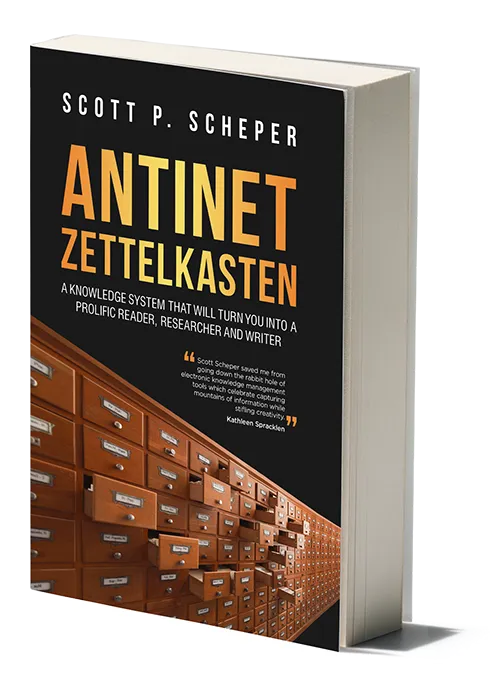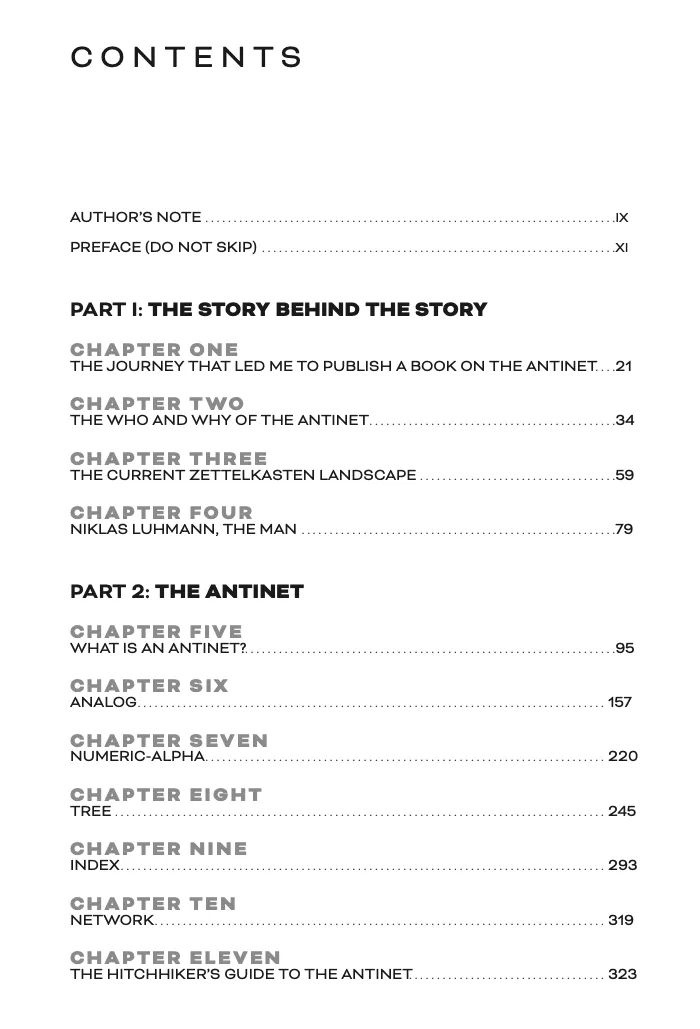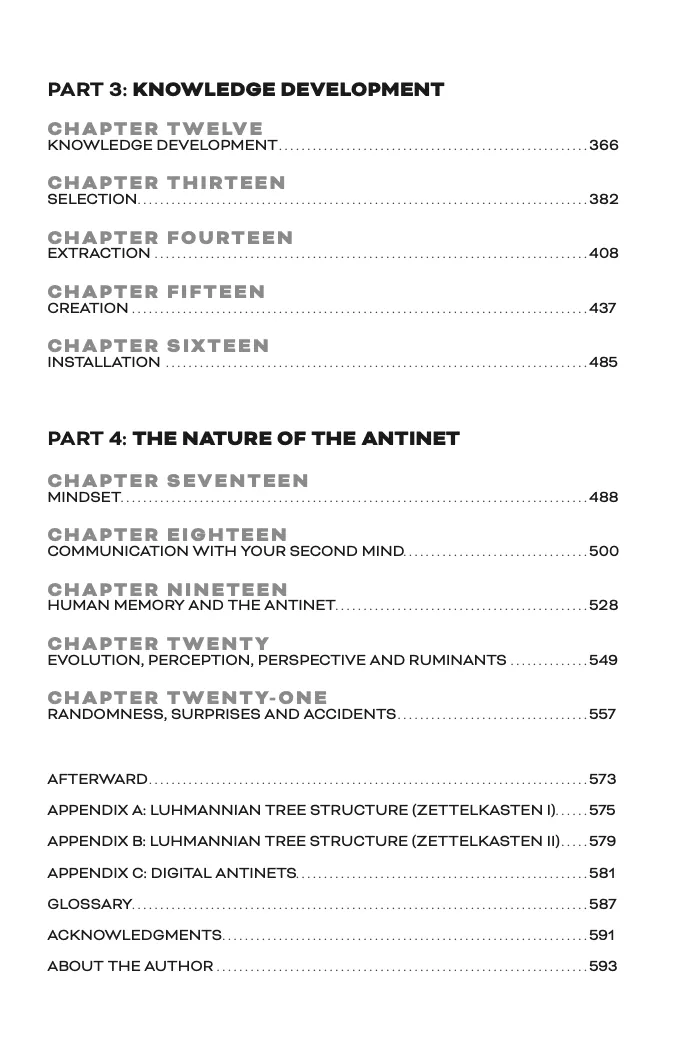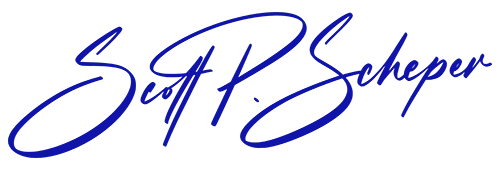NEW BOOK!
How to Become a Prolific
How to Become
a Prolific
Get The 594-page Book For Pretty Darn Close to Free
(You Only Pay Shipping & Handling)

LIMITED INVENTORY
I have printed 500 copies of the book. After the 500 copies sell out, there's no guarantee I'll do another print run. Why? Because this takes time, money, and energy to maintain. (I don't want to run a business and hire people. I'd rather read, think and takes notes all day.)
The inventory is updated hourly. If you order and the book is already sold out, you will be refunded.
If you're reading this message, then there are still copies left.

"Finally. A knowledge system that embraces the most powerful yet overlooked tools that exist: Pen, Paper, and... Your Brain."
—Nathan Cheever, Data Scientist and Writer

"The Antinet helped me understand material better... The biggest thing for me was that it helped me read between the lines."
—Mike Guarneri, Independent Writer

"The Antinet was a game changer for me. I'm now consistently reaching my daily goals of writing with ease."
—Lane Watson, Life-long Creative and Writer
A Way to Upgrade Your Brain
(That Actually Works)
Five Major Transformations Emerge After Reading This Book...

1. You Will Become a Learning Machine
If you're someone who loves reading and learning, yet has a full-time job (as an entrepreneur, a programmer, or other professional), the Antinet is a fantastic tool for ingesting books and connecting the ideas. You become a walking encyclopedia of brilliant ideas. Others in your workplace and your friends will begin to take notice.
But gaining external approval from others isn't "the true prize." The true prize derives from gaining internal approval from yourself. There's no better feeling in the world than growing your mind. You begin feeling more in control of the world around you. This is one clear benefit of the Antinet. It transforms you into a learning machine.

2. You Will Become a Content Machine
If you're an entrepreneur, or anyone who wants to grow their online audience, the Antinet transforms you into a content machine. By this I'm referring to online content (like short-form blog posts and articles). I'm also referring to content for YouTube videos and Podcasts. The Antinet gives you an edge over others in that most people create content that isn't valuable! Most content is not very developed. Most people develop their content on the fly. For instance, when they write a blog post, they do their thinking while writing the blog post! This leads to sub-par content and sub-par results.
With the Antinet, you do your thinking and pre-processing well before you write the first word or hit the record button. In brief, the Antinet can turn you into a content machine in order to grow your online audience.

3. You Will Become a Research Machine
If you're a PhD candidate who needs to write a thesis (or dissertation), or if you're anyone interested in writing academic papers (either to be published in journals, or independently), then the Antinet is the ultimate tool for such. Many PhDs and researchers struggle with writing. The Antinet completely eradicates this problem. In fact, you'll have a hard time cutting yourself off! An 80,000-word dissertation becomes trivial. Yet, your material will also be significantly deeper than merely using digital tools (like most people do). Whether you need to simply crank out a thesis for your PhD, or publish 550 papers like Niklas Luhmann, the Antinet can make you an absolute beast when it comes to academic research.

4. You Will Become a Writing Machine
Here's the thing: many of you have a work of genius living inside of you. You have a book that's secretly ruminating in your mind. Heck, you may have several books ruminating in your mind. The problem is: you have no system for making this book idea a reality. The Antinet is the very best system out there for writing a book.
However, I'm not talking about any type of book. I'm not talking about the typical ghost-written self-help book. The Antinet helps you write a book that is deeply footnoted, deeply researched, deeply referenced, yet also deeply entertaining! With the Antinet, you write your book while doing what you love: reading! Yes, reading. Writing sucks, reading is fun. The Antinet lets you do the fun stuff (reading), while also writing a book, piece by piece.

5. You Will Become a Thinking Machine
The Nobel-Prize-winning physicist Richard Feynman once detailed his thinking process during an interview. Feynman explained, his notes were not a record of his thinking; they were his thinking. "They are my thinking process," Feynman said. He explained how writing and thinking are the same things. When using an Antinet, you are conditioned to do one thing: to write! As a result, over time you become a thinking machine. However, not only are your thoughts developed in the short term (by way of writing by hand); your thoughts are evolved over the long term. With the Antinet, not only are you creating a thinking machine, you also become a thinking machine. This process is an incommunicable phenomenon that must be experienced first-hand to fully understand.
A Peak Inside The Table of Contents...


Grab Your Copy Now!
Become a Learning, Reading & Writing Machine...
Special "At Cost" Offer Get The 594-Page Book at the Cost of Printing, Shipping & Fulfillment: $19.96 (Both U.S. and International). Retails on Amazon for $70.72!
Limited Quantity of Books Available: I have printed 500 copies of the book for this special at-cost offer. After the 500 copies sell out, there's no guarantee I'll do another print run because it takes time, money, and energy to maintain.
The inventory is updated hourly. If you order and the book is already sold out, you will be refunded. If you're reading this message, then there are still copies of the book left.

You Have Stumbled Upon The Most Exciting Movement Within Knowledge Management
Please Read The Following Letter...

Scott P. Scheper
San Diego, California
Tuesday, 11:32 a.m.
Dear Friend,
I have no idea how you got to this page.
Maybe a friend told you about this crazy underground movement that's emerged around analog knowledge systems.
Maybe you got here by stumbling upon one of my YouTube videos.
Or, perhaps you're here by pure dumb luck.
It makes no difference, and here's why:
If you are someone who loves learning, reading, writing and thinking, then you have stumbled upon the most life-changing book you will read all year.
Before defending this outlandish proclamation, let me provide some background:
On a quiet day in the town of Oerlinghausen, Germany, there sits a man reading on a gray lounge chair. Sticking out of the man's book is a notecard with scribblings of his thoughts.
On the floor next to him sit a pile of books and academic journals. The room's walls are lined with bookshelves stocked with 11,000 titles.
Yet the object drawing the most attention today is the thing resting on the floor: a wooden notebox cabinet containing twenty-four drawers.
This object, known as a Zettelkasten in German, translates to "notebox."
People hold this mysterious notebox as the secret to how the "most important sociologist of the twentieth century" was so prolific.
And, indeed, he was prolific.
In his roughly thirty-year career, Niklas Luhmann (1927–1998) produced six-hundred academic papers and seventy books (an astonishing amount)!
What's more is that he even seemed to enjoy the process!
Unfortunately, Luhmann's Zettelkasten is grossly misunderstood today. Many have developed their own theories of how it works. They preach rules and techniques Luhmann never even used!
Moreover, the system's "magic" has been lost in an attempt to port it into the digital age.
In the Antinet Zettelkasten, you will learn the true nature of Luhmann's Zettelkasten——the analog version——the Antinet version. I detail the exact principles that made Niklas Luhmann so prolific.
After reading this book, you will be equipped with the same workflow that turned Niklas Luhmann into a legendary reader, writer, and thinker.
Get ready for the intellectual ride of your life!
Sincerely yours,

Scott P. Scheper
"The Man Fighting Modern Day Zettelkasten Blasphemy"
Here's More of What You Get When You Order The Book...
594-pages of the best material about Zettelkasten, knowledge development, reading, research, human memory, writing, and more.
112+ photos richly illustrating the material that you'll learn in the book.
26+ hand-drawn illustrated diagrams showcasing the concepts outlined in the book.
Beautiful typesetting and interior design that elegantly teaches the material.
Each of the concepts in the book are backed by deep, well-researched findings. The book contains 500+ footnoted references supporting the concepts.
The book's footnotes contain gems found in the form of other related books in the field of analog knowledge development.
New details about Niklas Luhmann and the origins of the Zettelkasten — Material from 4+ hours of interviews with Niklas Luhmann's youngest son.
Plus The Pride of Knowing You'll Have a More Superior Way of Reading Than 99.99% of Humankind
Grab Your Copy of the Antinet Book Today!
Become a Learning, Reading & Writing Machine...
Special "At Cost" Offer Get The 594-Page Book at the Cost of Printing, Shipping & Fulfillment: $19.96 (Both U.S. and International). Retails on Amazon for $70.72!
Limited Quantity of Books Available: I have printed 500 copies of the book for this special at-cost offer. After the 500 copies sell out, there's no guarantee I'll do another print run because it takes time, money, and energy to maintain.
The inventory is updated hourly. If you order and the book is already sold out, you will be refunded. If you're reading this message, then there are still copies of the book left.

Here's Why I'm Giving The Book Away at a Price Lower Than Cost
(And No, It's Not a Gimmick.)

I have included a screenshot of the book's cost.
This quote was sent to me by my print shop.
In total, this comes out to $28.96 (for U.S. and International).
However, I'm making the book available at the price of $19.96 (which means I'm losing money).
I am selling each book at a price lower than the cost of printing, fulfillment, and shipping, and not a penny more.
Why am I doing this?
Because I'm a saint.
But really, there are three reasons I'm doing this.
First, I spent over a year reverse-engineering how the Zettelkasten really works. I did this by writing out by hand many of Niklas Luhmann's notecards (the Godfather of the Antinet Zettelkasten).
I'm doing this because I don't want you to waste a year of your life doing this! I've already done the legwork for you. I'd rather you learn the Antinet, and create the work you're uniquely called to create.
I'm doing this because I've experienced the power of the system firsthand. It's changed my life, and my only regret is that I didn't learn it earlier!
Therefore, my goal is to get this book into as many hands as possible.
The second reason I'm doing this is to stick it to the man. By "the man," I mean Amazon. And by "Amazon," I mean Jeff Bezos (And, by "Jeff Bezos," I mean his girlfriend Lauren Sanchez. Because, let's be honest, she's the one running the show).
Here's the deal: Getting a 594-page book printed on Amazon's platform costs $42.43 per book. With their fee-sucking structure added on top of this, I'm forced to charge $70.72 minimum! This nets me $0.00 in royalties. This is absurd!
Here's a screenshot showing the (insane) minimum price Amazon forces:

Look, I'm sure the book is worth more than $70.72 in value. Amazon lists one book covering analog knowledge systems in Early Modern Europe at $185! Yet that book is dry and littered with academic jargon. Even if you're a nerd like me who's interested, I've gleaned its most useful material, and reference it in my book.
I realize some people may prefer the convenience of using Amazon. However, my goal is to get this book into as many hands as possible. Selling it at that price isn't going to achieve that goal.
I'm a realist. I'm not going to get rich selling this book. Therefore, I've decided to go the extra mile and secure a deal with a print and fulfillment shop to bulk-print the book.
This allows me to get the cost per book down significantly.
Last, the final reason I'm selling this book at cost is because I know by transforming your life, you may become interested in other things I share that will transform you even further!
That's all.
I know the Antinet Zettelkasten will change your life, and I can't wait for you to read it!
The Antinet Has Changed Lives!
Don’t Take My Word for It (I am a Biased Pig)—Hear What Others Have to Say…

"Scott gave me direction for developing an Antinet like nothing else online. No one else has researched Luhmann’s ways and built them out better. Scott’s encouraging the analog way is as valuable as it is rare."
—Nathan Cheever, Data Scientist and Writer Who Covers How Societies Rebuild

"The Antinet helped me understand material better... The biggest thing for me was that it helped me read between the lines."
—Mike Guarneri, Independent Writer Exploring How Ancient Celtic Ways Can Naturally Cure Mental Health Challenges

"I was thrilled when I found out about Luhmann and his zettelkasten method on growing one's knowledge online. So of course after hours of youtube binging on zettelkasten methods all I found is setups videos after setups videos and but never really found the beef for it. It was until I saw Scotts clip on youtube on how he did it to grow his knowledge that I really have this "a-ha" moment with the zettelkasten method. He really put things into perspective to grow my knowledge!"
—Peter Lo, Software Developer from Thailand Who Uses the Antinet to Learn New Skills

"I wrote my first book when I was in graduate school; my second soon after, but nothing since. Now that I am about to retire, I feel that former stirring once again. Scott Scheper saved me from going down the rabbit hole of electronic knowledge management tools which celebrate capturing mountains of information while stifling creativity. Let Scott show you what he opened up for me: the magic of paper and pen as he provides an in-depth exposition of the history and power of the finest assistant to the human brain ever developed: the Zettelkasten of Niklas Luhmann."
—Kathleen Spracklen, Computer Scientist, Linguist and Microcomputer Chess Pioneer

"I stumbled on the Zettelkasten idea through YouTube and it seemed to be the thing I had been looking for all my life. But after several faltering attempts to start writing notes, first in Notion, then in Obsidian, I realized I needed some help. I found Scott, or rather, Scott found me (thanks YT algorithm), and as he introduced me to the hard way, the right way, it felt like turning a corner and finding El Dorado. Scott took me step-by-step through the process, and I don’t know that I could have made progress without him. As a result, my Antinet grows by the day, and I have several projects in the works that for years have only been dancing around in the nether regions of my brain."
—Steve Heimler, Founder of the Heimler's History YouTube Channel teaching 400,000+ Subscribers about AP History

"I've been wanting to write a comprehensive book on Creativity and Chaos for some time now. Between digital notes and paper notebooks, I couldn't find a lot of notes easily, much less a consistent thread for my ideas in so many places. I stumbled upon Scott on social media one day and saw him talking about the Antinet. I was hooked on the idea. The Antinet was a game-changer for me. I'm now consistently reaching my daily goals of writing with ease. Best of all, it's some of the best writing I've ever done, and I truly believe it's because his system encourages deep thinking and making interesting connections."
— Lane Watson, Life-long Creative and Writer Who Uses the Antinet to Think Deeply

"I was drowning in information. I tried digital tools and I created a mess for myself. I prefer paper journals and thought that someone might be building an analog Zettelkasten. I found Scott's videos, blogs and podcast. It changed what I thought possible. I now have a process for reading and developing knowledge from what I read. Now I get excited to spend time with my ANTINET. And I am close to launching my new podcast. Sober over 50."
—Terry Grier, Entrepreneur and Corporate Insurance Broker Who Uses His Antinet to Create Content About Sober Living Over the Age of 50

"I came across Luhmann's Zettelkasten in 2020, and, since then, I have been on a quest to better my thinking and writing. Unfortunately, in the digital world, Zettelkasten implementations fall short in many crucial fronts. Scott's Antinet Zettelkasten brings the focus to pen and paper, allowing you to focus on what truly matters: creating notes and producing intellectual output."
—Nikolaos Panaousis, Lifelong Learner and Thinker Who Uses His Antinet in Pursuit of Higher Education

"The Antinet makes you more concentrated and it seems to evoke more thought associations. It has given me a new panache, made me read more and adds a bit of self-esteem and contentment about my use of time when I am not working. It makes you retain more information, see better the parallels between different thought processes and sometimes correct or adjust ideas you had. I still have to learn and elaborate a lot, but in little details I see positive changes."
—Eduard De Bie, 67-year-old Physician from Belgium Who Uses His Antinet to Sharpen His Mind

"I needed to write a thesis to become an expert in real estate law. With traditional personal knowledge management methods, I lost a lot of time trying to understand zettelkasten methodology and tweaking Obsidian. Now, thanks to Scott and all the free content he put online, I can easily focus on developing my knowledge and writing my thesis. The Antinet not only helped me write my thesis, but helped me with my other work, too. Scott showed me the direction of a journey that will last a lifetime...I hope!"
—Erwann Laville, Legal Researcher and Writer located in France
Grab Your Copy of the Antinet Book Today!
Become a Learning, Reading & Writing Machine...
Special "At Cost" Offer Get The 594-Page Book at the Cost of Printing, Shipping & Fulfillment: $19.96 (Both U.S. and International). Retails on Amazon for $70.72!
Limited Quantity of Books Available: I have printed 500 copies of the book for this special at-cost offer. After the 500 copies sell out, there's no guarantee I'll do another print run because it takes time, money, and energy to maintain.
The inventory is updated hourly. If you order and the book is already sold out, you will be refunded. If you're reading this message, then there are still copies of the book left.

Stop Wasting Your Time with Digital PKM!
Digital Notetaking Tools are Great for Storing Information, But They're Not Great for Doing What Matters: Developing Knowledge!
Look...
I've been through it all.
I've taken high-end Personal Knowledge Management courses costing thousands of dollars. I've spent countless hours using digital notetaking apps. And I've probably tried every knowledge management and productivity tool on the planet.
There was a time in my life when I mastered the digital notetaking app, Obsidian.
It's pretty much all I did. I was an absolute pro (in my own mind). I built out amazing templates for creating notes, beautiful metadata conventions, and tagging schemes for "managing" my knowledge.
Maps of Content? Check.
Structure Notes? Check.
Community plugins? Check.
Beautifully customized theme? Check.
I was an Obsidian notetaking junkie (what I like to call "a bubble-graph boi").
My goal was to use my notes in order to write a newsletter, or even a book based on my diverse readings across many disciplinary fields (psychology, philosophy, and marketing).
After countless hours and many months, I was left with an Obsidian vault containing 1,272 notes in it.
It was at this point I realized that I had created a colossal mess.
What I was doing was majoring in the minor!
I realized what I had become... a professional "note-linker."
When it came time to turn my knowledge into written output, I was more lost than when I had started!
This set me on a quest to uncover the true magic of knowledge systems.
My research led me to a system used by the most prolific researcher of the twentieth century: the sociologist, Niklas Luhmann. He devised a uniquely-architected analog system that helped him produce over seventy books, and five hundred peer-reviewed papers.
This system is known as a Zettelkasten in German, which translates to "notebox" or "slipbox" in English.
Yet, there's one big problem with the Zettelkasten today...
The problem is this: almost everywhere you look online, there's misinformation about how the Zettelkasten works.
I spent over a year reverse-engineering and implementing the Zettelkasten in its purest form—the analog form. In doing this, I believe I've uncovered the system's true magic. Understood in its purest form, the Antinet will turn you into a prolific learner, reader, researcher and writer.
I am on a mission to teach the Zettelkasten in what I hold to be its most powerful form—the analog form—the Antinet form.
Digital technology is better for most things; however, I contend there is still at least one thing it's not the best for: and that is, thinking!
(End of sermon)
Grab Your Copy of the Antinet Book Today!
Become a Learning, Reading & Writing Machine...
Special "At Cost" Offer Get The 594-Page Book at the Cost of Printing, Shipping & Fulfillment: $19.96 (Both U.S. and International). Retails on Amazon for $70.72!
Limited Quantity of Books Available: I have printed 500 copies of the book for this special at-cost offer. After the 500 copies sell out, there's no guarantee I'll do another print run because it takes time, money, and energy to maintain.
The inventory is updated hourly. If you order and the book is already sold out, you will be refunded. If you're reading this message, then there are still copies of the book left.

The Antinet Transforms You in Many Surprising Ways...
Here Are Some of The Things People Have Shared With Me*
✔️ You'll read books like a professor.
When you learn the Antinet, you will become an efficient learning machine. You will learn how to extract the best concepts from the books you read. I teach a practice of knowledge extraction ensuring you will avoid getting bogged down with irrelevant details when you read. You will avoid spending too much time on things that don't matter. With the Antinet, you will avoid majoring in the minor.
✔️ The Antinet will prevent your mind from "turning to mush."
For some, Alzheimer's runs in their family. The Antinet enables a robust process for developing "mental sharpness." One Antinetter described the process of using the Antinet like "Runner's High." After you finish a knowledge development session, she says it's like you experience "Reader's High."
✔️ You will become a better thinker.
There's an incommunicable magic that happens when you put pen to paper. Your thoughts are developed more clearly. You're able to write in a deeper manner, and in turn think in a deeper manner. You will experience this effect from using an Antinet, but it's even greater than that. You will not only develop your short term thoughts in a deeper way, you will also witness the branching evolution of these deep thoughts over the long term. Your thoughts are chain-linked together over time (something called associative chaining in human memory). In turn, this surfaces brilliant ways of thinking that will provoke interesting insights you couldn't have preconceived.
✔️ You will become a better writer.
The biographer Robert Caro once recounted a story while he was in college about his writing professor. His professor reprimanded Caro, "You must stop thinking with your typewriter!" Ever since, Caro wrote each of his book drafts by hand. He has since gone on to win two Pulitzer Prizes. When you use the Antinet, you will find your writing to improve dramatically.
✔️ You will become an academic publishing machine.
I've had several Antinetters come to me seeking help with their PhD thesis. After learning the Antinet, not only have they gone on to complete their thesis, their goals expanded beyond this. The Antinet is not only for helping you write your thesis, it's for helping you become an academic publishing machine. Whether your goal is to remain an independent researcher, or become a professor, the Antinet serves as the ultimate tool for attracting the attention of other scholars in your field.
✔️ Unlock that book buried inside of you.
Most likely, buried inside of you is a book you've always wanted to write. Heck, you probably have multiple book ideas ruminating in your mind. The answer to why you haven't written them yet is actually pretty simple. You have no clear process for writing it. The Antinet introduces a process that makes writing happen naturally (without the typical blank page, blinking cursor experience of writer's block).
✔️ Transfer the joy of reading into the joy of writing.
Finally write the book you were born to write (without even realizing you're writing it). What if you could learn a process that allows you to enjoy the pleasures of reading, while also writing a book?
✔️ Learn how to create books that write themselves.
Paradoxically, the framework I teach you will enable your books to practically write themselves. The Antinet enables you to focus on developing your thoughts, while saving the organization of the book for later. You'll learn how to work on micro-projects. This will end up turning you into a writing machine. Whether this means writing the book you've always wanted to write, or finishing the dissertation that's been haunting you.
✔️ Create deep, high-quality pieces of written work (without it being painful).
When it comes to the various tools people use for taking notes, one thing I haven't seen talked about anywhere else is the style of writing that each system optimizes for. The typical 30-day challenge writing course teaches how to write shallow pieces of writing. I assure you of one thing: the Antinet is the best system for producing deep writing. By this I mean your material becomes evolved and deeply thought out. Your writing will be backed with references and footnotes galore. Your audience, peers, professors, family, and others will wonder how you are capable of producing so much deep material so quickly.
✔️ You'll develop the peace of mind knowing that you'll never have to switch knowledge systems again.
We all know the feeling. We get obsessed with whatever shiny new tool is out there. We invest all this time and energy into learning a new system and mastering it. Soon, maybe after a few months or a year, we realize it's over-hyped and that it makes our real goal (like writing) even more difficult. For instance you try a commonplace book, or Ryan Holiday's notecard system, or Obsidian, Roam Research, or LogSeq. You buy into the hope that it will solve your challenges, only to discover that it's hype. I promise you, with the Antinet, you will never have to switch again. It's a system Luhmann used over four decades for a reason. The Antinet just plain works. It's something I use and will never switch away from.
✔️ Organize the brilliant patterns you spot while reading.
When you read across many different disciplinary fields, the mind has a magical way of spotting recurring patterns and themes that others may overlook. The problem revolves around capturing these brilliant insights and installing them into your long-term memory. The Antinet serves as the ultimate solution for doing this.
✔️ Become a content machine that can pull from an endless number of ideas.
The Antinet evolves in such a way that it becomes a tool for generating an endless amount of ideas. The ideas you can seemingly pull out of a hat are not ordinary in nature; the ideas you can pull from are well-developed, high-quality insights that are captured from engaging with books.
✔️ Become a learning machine.
The problem with digital tools centers around the fact that creating digital information is cheap. It's frictionless. Before you know it, you've created so much information that the good crowds out the bad. With the Antinet, you'll have a system that is evolved to only surface the most potent pieces of wisdom that you will be retained for the rest of your life.
✔️ Become a prolific essayist.
Many Antinetters have used the system to model prolific essayists like George Orwell and C.S. Lewis. The Antinet helps you pre-process your thoughts so that writing essays becomes a walk in the park.
✔️ The perfect system for working on multiple projects at once.
One Antinetter, an archivist from Norway, said it best: "The Antinet answers the problems I've had for decades." He was referring to the fact that he works on multiple writing pieces and books asynchronously. "I'm working on six books right now. The Antinet has been the missing system for developing them all without going crazy."
*In the summer of 2022, I conducted Zoom interviews with twenty-six people who have implemented an Antinet Zettelkasten. Every point above has come from things people have shared with me during these conversations.
It Goes Beyond Reading, Thinking, and Writing...
There Are Many Other Emergent Effects of The Antinet!
✔️ You'll finally be able to share your ideas with confidence.
The Antinet is like a pre-processing engine for your thoughts. Before you even create an essay, book, podcast, or video, the thoughts you share will have been deeply evolved. The thoughts you share are formed by deep research and dialogue with other minds (the books, articles, and sources you engage with). Because of the knowledge development process you'll learn in this book, you will overcome another challenge: having the confidence to communicate your ideas. You will become excited about sharing your knowledge because you've earned the right to share.
✔️ Gain clarity around your ideas and your pursuits.
One Antinetter, a retired German academic in his seventies, asserts the Antinet gives him clarity around his thinking. Furthermore, he says, "The Antinet gives me something to do with my time!"
✔️ Uncover fascinating material across many disciplinary fields.
The list of disciplinary fields I've seen Antinetters explore include: Philosophy of Mind, Morality, Data Science, Biology, Greek History, Theology, Modern Societal Issues, Linguistics, Math, Physics, Societal Collapse, Societal Rebuilding, Psychology, Productivity, and Cognitive Science. This is but a small fraction of the fields the Antinet can be used to research. The list is endless.
✔️ Create a powerful co-author.
Niklas Luhmann referred to his Antinet as a communication partner. This was not an accident. He really viewed his Antinet as someone who he could collaborate with. One Antinetter, a Director of Analytics and Logistics for the military, uses his Antinet for the same reason—a communication partner. He's already published one book with a human co-author. He's now using his Antinet to write another book by himself.
✔️ You may be referred to as a "genius" behind your back.
As ridiculous as it sounds, one common theme I have experienced, and others have told me they've experienced as well, is that of being labeled a "genius" by others. When you can instantly recite a wide array of material off the top of your head, people will start to wonder if your brain is built differently than others. They'll start labeling you "a genius." Don't let it get to your head.
✔️ You will never have to switch tools again.
Up until now, the main problem with analog tools centered around the inability to retrieve individual thoughts. Furthermore, if one could find individual thoughts, there's an issue with space. One could not elaborate on individual thoughts if they run out of space in their commonplace book, Bullet Journal or Moleskine notebook. Inevitably, you may switch over to digital, which has its own massive list of problems. You'll end up switching from Apple Notes to Evernote, Notion, Obsidian, Roam Research, etc. Then, after some time, you miss the power of thinking by hand, and you may switch back again to analog. It's an endless cycle. The Antinet, however, is the last knowledge system you'll ever need.
✔️ Get in touch with a higher power.
It may seem out there, but I have heard a familiar theme from several Antinetters. They describe the experience of engaging with a higher power while using the Antinet. One Antinetter, who practices Zen Meditation, observes how the experience of quietly reading and developing thoughts is similar to his meditation practice. Another Antinetter, a minister who is also getting his PhD in Christian Theology, describes the experience of engaging with one's internal voice as developing a closer connection with God.
✔️ Retain the material from the books you read. Forever.
Do you ever fear that you won't remember the gems of wisdom you uncover while reading? Here's the reality: Most people who spend their time reading ought to go fishing instead. The reason why is because they do not have a system for retaining that knowledge forever. Heck, even if they use a digital system, the material inevitably falls into a black hole. It's impossible to forget about a block of notecards staring at you in the face. The Antinet is the way. I have spoken.
✔️ Avoid reading inefficiently.
If you don't take notes in a specific manner, you'll end up wasting time when reading. You'll never commit to memory the things that matter. Or even worse, you'll take the wrong types of notes that will end up wasting your time. You'll ingest books way too slowly, and spend time that could otherwise be put to valuable use. The workflow I teach with the Antinet will show you how to ingest books efficiently.
✔️ Unplug from the digital world of distraction.
The Antinet serves as the red pill for the matrix you're hooked up to. Aldous Huxley's A Brave New World introduces a drug called Soma that numbs one's thoughts. Sure, there are anti-anxiety medications today, but the real Soma of our modern time is information. Digital tools enable the real Soma of today. We're constantly injected with news, notifications, alerts, and distractions. One study observed that when one works digitally, they're presented with a distraction every six minutes causing them to switch tasks. The Antinet retrains your mind. It forces you to unplug and develop knowledge the old way. The analog way.
✔️ Kill procrastination for good.
For most people, the biggest challenge you face every day is simply getting started! In today's world, many are forced to think using digital tools. There's only one problem: the best environment for thinking happens away from the computer! It's no wonder you struggle with procrastination when YouTube is just a click away. With the Antinet, you'll be developing habits that make procrastination a thing of the past. Discipline is a muscle. In the beginning, your muscle will be weak, but very quickly, the Antinet develops your mind such that procrastination becomes something the old you did.
✔️ Gain clarity on what books to read
When you're conditioned to use digital tools, you're exposed to an information firehose. As such, it becomes difficult to select what information sources are really important. It becomes difficult to select the primary material that you should read. The Antinet enables you to slow down, regain perspective on what truly matters, and gain clarity. You will no longer experience the feeling of taking two steps forward, and one step back. You'll never second-guess whether you're on the right path.
✔️ Regain your love for reading, thinking, and writing.
One Antinetter, a life coach from the Netherlands says it best, "I love writing. I lost that love for some reason. The Antinet helped me regain that love." How does the Antinet help with this? It creates an environment where you can unplug and think deeply. It's been described as "an almost spiritual experience."
✔️ Eliminate impostor syndrome.
The number one thing holding a lot of people back is fear. Everyone suffers from it. We fear that our ideas will be ridiculed. A large part of this fear stems from the maturity of our thoughts. When you use the Antinet your thoughts will undergo significant development. This is not an easy process. It takes work. This is a good thing because you'll feel like you have earned the right to share your ideas with the world. Why? Because it's gone through more stages of development before it even makes its way to the first draft. As a result, when you use the Antinet, impostor syndrome magically seems to dwindle away.
✔️ You will develop healthier time management skills.
Deadlines are a part of life. You may feel like you don't have enough time to complete a project. For instance, a PhD thesis. The problem of time management is perpetuated by the modern super-sonic digital information age. The Antinet resets the monkey mind and enables you to gain a better relationship with time. It forces you to unplug and focus on what really matters. You'll find yourself completing major projects, and you'll find your focus improves after using the Antinet.
✔️ Gain clarity on what you should even work on.
Here's the truth: confusion equals suffering. In this book, there is a chapter on selection, which teaches you how to select what to even work on in the first place. It shows you how to select books, how to select projects, and how to extract material within what you select. Once you learn this process, you'll be able to enjoyably pursue your intellectual interests (without second-guessing yourself).
✔️ You will learn how to regain momentum if you're in a creative rut.
Let's face it: the most insidious thing out there is inertia. The most talented thinkers I know have fallen into inert phases at some point. The Antinet works in a unique way that enables you to regain momentum and never be thwarted again. This alone has been life-changing for many people.
✔️ You will learn how to balance the joys of learning with being output-focused.
This is the dichotomy of exploration vs. exploitation. A significant section of the book is dedicated to teaching you how to do research. "Not all who wander are lost" is great advice. However, it can only get you so far. Some go so deep into the forest of whatever field fascinates them that they end up getting stuck. They never return to the real world to teach and share with others what they've learned. You'll learn how to craft a strategy for confidently letting your research guide you, without the risk of becoming lost in the woods forever. You'll learn how to craft a plan that enables you to enjoy the benefits of emergent research, while also gearing you towards honing in on a research area that is focused.
✔️ You will learn how to make the leap from notes to output (and have it be enjoyable).
Notes are the means, not the end. Many people who learn PKM systems spend their days taking notes instead of doing what really matters: creating output! With the Antinet, you'll develop knowledge strategically in a way that helps you create output. And the best part is this: the process will be enjoyable!
✔️ All of your questions about the Antinet Zettelkasten will be answered.
If you're already familiar with the Antinet, yet you're confused about things like the numbering of cards, this book will answer all of your questions in explicit detail. Anything you've struggled to understand will be answered with pictures and diagrams. You'll learn how the Index works. You'll learn how to install new cards. You'll get detailed diagrams of card numbering schemes. You'll learn how many notes you should take while reading. You'll learn all of the advanced practices of working with an Antinet.
Grab Your Copy of the Antinet Book Today!
Become a Learning, Reading & Writing Machine...
Special "At Cost" Offer Get The 594-Page Book at the Cost of Printing, Shipping & Fulfillment: $19.96 (Both U.S. and International). Retails on Amazon for $70.72!
Limited Quantity of Books Available: I have printed 500 copies of the book for this special at-cost offer. After the 500 copies sell out, there's no guarantee I'll do another print run because it takes time, money, and energy to maintain.
The inventory is updated hourly. If you order and the book is already sold out, you will be refunded. If you're reading this message, then there are still copies of the book left.

Frequently Asked Questions
1. How long will it take for the book to arrive?
Your book will be packaged up beautifully, and sent from Taylor, Michigan, USA.
For U.S. customers, you can expect the book to arrive in 4-12 business days (could be a lot sooner).
For International, you can expect the book to arrive in 8-20 business days (could be a lot sooner).
You will receive a tracking number via email immediately after your order.
If you have any questions, don't hesitate to contact support:
+1 (949) 835-5125
30021 Tomas St, Suite 300, Rancho Santa Margarita, CA 92688
Mon. - Fri. 10 a.m. - 6 p.m. PT
2. Why use analog if it takes more time than digital?
Another perceived con of analog systems revolves around the extra effort it requires. Many perceive writing by hand as harder, and something that requires more time.
After you learn the Antinet, you will come to realize how the old way (the perceived slow way), ends up saving time in the end.
Here's a PDF that outlines why the so-called difficulty of analog systems ends up being a pro, rather than a con:
3. What if I can't take my notebox with me everywhere?
Another question I sometimes get revolves around the worry of mobility. People fear not having access to all of their notes at all times.
What would you rather have: 24-7 access to less-developed information on your iPhone, or a more developed mind?
The benefit of having access to all of your notes at all times stands as an illusion. You will come to think of the Antinet as containing knowledge (not information). The best way to create knowledge is to develop it deeply and slowly. This is the way of the Antinet.
Here's a PDF that outlines why being able to take all of your notes with you wherever you go is actually overvalued:
4. What about the risk of fire or flood with my Antinet?
This is a good question and a valid one. When using analog systems, there's always a risk that you could lose your valuable knowledge due to fire, flood, or other natural disasters.
There's a risk of data loss with all systems, even digital ones. There are certain things you can do to mitigate this risk, however.
Some Antinetters in the Reddit community have solved this for themselves by making it a practice to snap pictures of the notes they create at the end of the day. In fact, Apple Notes has a fantastic and snappy user experience for making backups easy. Plus, Apple notes automatically scans and indexes the text on your notecards.
Another solution is to invest in fireproof and water-proof cabinets (yet those can be costly).
In the end, most have found that the pros of analog outweigh the risk of fire or flood.
What you'll find is that using analog systems will make you more productive, and even incentivize you to turn your notes into output quicker by getting them published!
Here's a PDF guide on why you should not be worried about the risk of fire and flood:
5. Do you offer refunds?
Yes. I believe in this book so much that if you're unsatisfied (for any reason), you can send the book back within one-year, and get a 100% refund. No questions asked.
Just email me at [email protected], or call +1 (949) 835-5125. We'll share the return address, and refund every penny.
If you're not happy, I'm not happy!
6. Why would I want a 594-page book?
There are several reasons the book is 594-pages.
First, it serves as proof of one thing: The Antinet turns you into a writing machine! The book took roughly seven months of working with the Antinet. After that, it took only three months to spit out 190,000 words of deeply researched, deeply footnoted content. This type of output is what the system is all about. It's about slowing down, and developing deep thoughts. As a result, you'll be able to create rich pieces of work (without the typical pains of writing).
Second, don't feel like you have to read the entire book. It's really three (or four) books in one! This book will serve as a companion of yours for years. You can pick it up at various points and gain valuable insights for developing knowledge. Whenever you need a little boost for your reading or writing workflow, this tome shall serve as your knowledge bible.

About The Author
Meet The Man Restoring The True Power of Zettelkasten...
Scott P. Scheper (aka "The Analog Knowledge Revolutionary") is a writer, copywriter and entrepreneur residing in Orange County, California. After leaving the cryptocurrency company he co-founded, Scott set out in search of more fulfilling work. This led him, of all things, to teach the power of analog tools for developing the mind.
Scott has been a lot of things and done a lot of things in his career. Within the online marketing world, he is still known as an underground legend ("an underground performance marketing whale" is what he was referred to as).
Scott's performance marketing feats were achieved while working out of a little shack on a hill in St. Thomas, Virgin Islands, using a slow 8 Mbps internet connection.
This was even before Scott took a technology company that was $4 million dollars in debt to the hottest cryptocurrency of 2018 (and later got listed on Coinbase).
Scott was able to do all of this using a unique mix of skills: writing, copywriting, advertising, data science, programming, and marketing.
Scott self-taught himself all of these skills using books and notecards.
Scott is now on a mission to share the power of analog tools for developing the mind. Pen and paper is the most overlooked, yet most powerful way to develop your skillset and become a more prolific reader, writer, and thinker.

Scheper's Bold Guarantee
I am so confident the Antinet Zettelkasten book will make you a better reader, writer, and thinker that⸺if you're unsatisfied (for whatever reason)⸺you can send the book back within one year and receive a 100% refund. No questions asked!
Just email me at [email protected], or call +1 (949) 835-5125. You will be given a return address to send the book back to. I will personally see to it that you are refunded every penny⸺both the cost of the book and the shipping cost.
How's that for fair?
I donate five percent of all profits to LittleFreeLibrary.org
I am a man on a mission to create an army of independent writers, creators, and thinkers who make a killer living.
Contact

+1 (949) 835-5125

30021 Tomas St, Suite 300, Rancho Santa Margarita, CA 92688

Mon. - Fri. 10 a.m. - 6 p.m. PT
Contact

+1 (949) 835-5125

30021 Tomas St, Suite 300, Rancho Santa Margarita, CA 92688

Mon. - Fri. 10 a.m. - 6 p.m. PT





